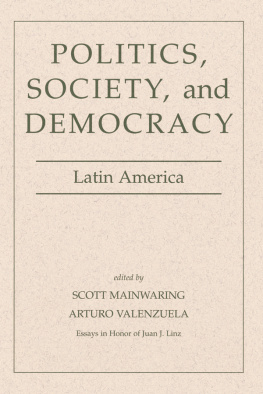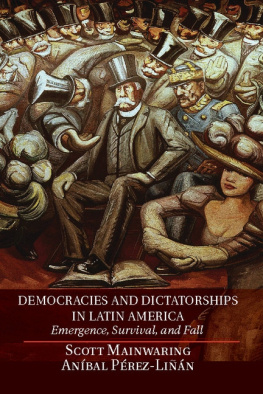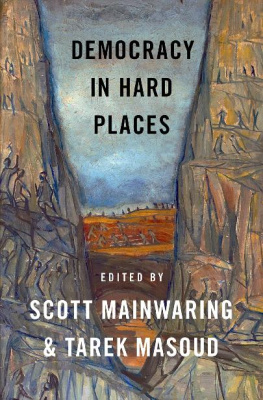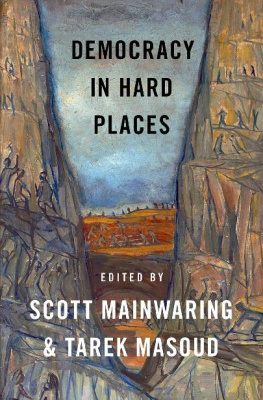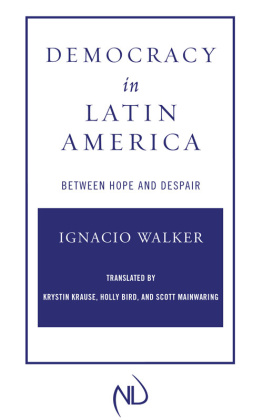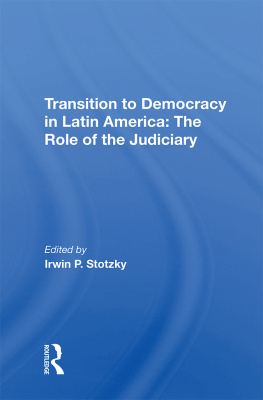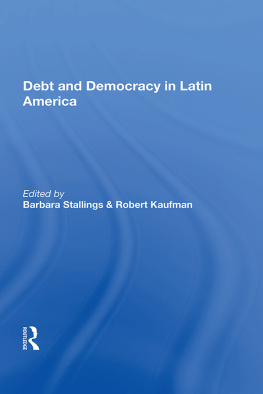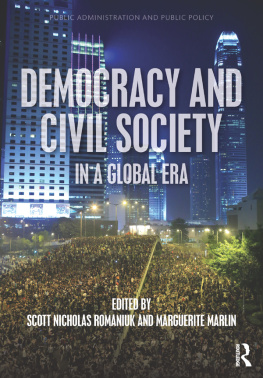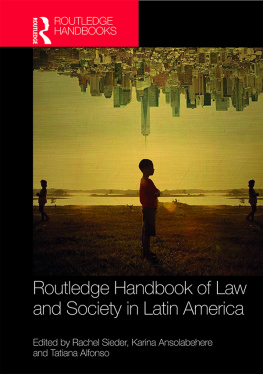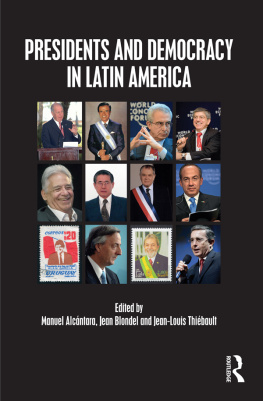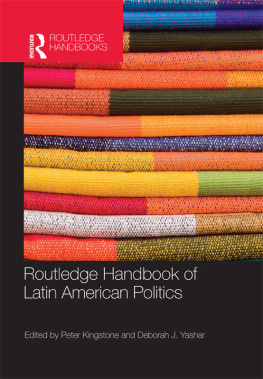Politics, Society, and Democracy
Essays in Honor of Juan J. Linz
H. E. Chehabi, Richard Gunther, Scott Mainwaring,Alfred Stepan, and Arturo Valenzuela, Series Editors
Politics, Society, and Democracy: The Case of Spain, edited by Richard Gunther
Politics, Society, and Democracy: Comparative Studies, edited by H. E. Chehabi and Alfred Stepan
Politics, Society, and Democracy: Latin America, edited by Scott Mainwaring and Arturo Valenzuela
Essays in Honor of Juan J. Linz
First published 1998 by Westview Press
Published 2018 by Routledge
711 Third Avenue, New York, NY 10017, USA
2 Park Square, Milton Park, Abingdon, Oxon OX14 4RN
Routledge is an imprint of the Taylor & Francis Group, an informa business
Copyright 1998 Taylor & Francis
An earlier version of Chapter 6, The Crisis of Presidentialism in Latin America, by Arturo Valenzuela, appeared in Journal of Democracy, Vol. 4, No. 4 (Oct. 1993).
All rights reserved. No part of this book may be reprinted or reproduced or utilised in any form or by any electronic, mechanical, or other means, now known or hereafter invented, including photocopying and recording, or in any information storage or retrieval system, without permission in writing from the publishers.
Notice:
Product or corporate names may be trademarks or registered trademarks, and are used only for identification and explanation without intent to infringe.
Library of Congress Cataloging-in-Publication Data
Politics, society, and democracy. Latin America / edited by Scott
Mainwaring and Arturo Valenzuela.
p. cm. (Essays in honor of Juan J. Linz)
Includes bibliographical references (p. ) and index.
ISBN 0-8133-8548-2 (HC) ISBN 0-8133-3726-7 (pbk)
1. Latin AmericaPolitics and government. 2. Authoritarianism
Latin America. 3. Executive powerLatin America. 4. Democracy
Latin America. I. Mainwaring, Scott, 1954 . II. Valenzuela,
Arturo, 1944 . III. Series.
JL960.P655 1998
320.982dc21
97-33166
CIP
ISBN 13: 978-0-8133-3726-5 (pbk)
Contents
Scott Mainwaring
Miguel Angel Centeno
Susan Eckstein
Carlos Huneeus
Jonathan Hartlyn
Arturo Valenzuela
Scott Mainwaring and Matthew S. Shugart
Michael Coppedge
Joseph L. Love
J. Samuel Valenzuela
The series editors wish to acknowledge the generous support for this project granted by the Program for Cultural Cooperation between Spains Ministry of Culture and the United States Universities. Without that financial assistance this enormous project would have been difficult, if not impossible, to complete successfully.
The editors of this volume would also like to thank the following persons for their assistance: Esperanza Palma and John Rieger for translating Carlos Huneeuss chapter, originally written in Spanish; Carol Stuart for copyediting and preparing the book for publication; Caroline Domingo for copyediting; and Karl Yambert and Barbara Ellington of Westview Press for their attention and assistance.
Miguel Angel Centeno is Assistant Professor of Sociology at Princeton University. He received his Ph.D. from Yale University. Recent publications include Democracy within Reason (2nd ed., 1997), Toward a New Cuba (1997), and The Politics of Expertise in Latin America (1997). He is currently working on a book on war and the state in Latin America, an article from which will be published in the American Journal of Sociology.
Michael Coppedge is a Faculty Fellow at the Kellogg Institute for International Studies of the University of Notre Dame and Associate Professor in the Department of Government. His book, Strong Parties and Lame Ducks: Presidential Partyorchy and Factionalism in Venezuela (Stanford University Press, 1994), analyzes institutional problems underlying the crisis of Venezuelan democracy. His current research seeks to explain cleavages, fragmentation, and volatility in eleven 20th-century Latin American party systems. Coppedge wrote his 1988 dissertation at Yale University under the direction of Juan Linz and has taught at the Nitze School of Advanced International Studies (SAIS) of the Johns Hopkins University, Princeton, Yale, and Georgetown.
Susan Eckstein is Professor of Sociology at Boston University. She is the author of Back from the Future: Cuba under Castro (1994), The Poverty of Revolution: the State and Urban Poor in Mexico (1977, 1988), and The Impact of Revolution: A Comparative Analysis of Mexico and Bolivia (1976), as well as editor of Power and Popular Protest: Latin American Social Movements and author of approximately four dozen articles on Latin American politics, economics, and society. She is President of the Latin American Studies Association (19971998).
Jonathan Hartlyn is Associate Professor of Political Science at the University of North Carolina at Chapel Hill. He is interested in comparative issues of democratization and development in Latin America. His publications include The Politics of Coalition Rule in Colombia (1988) and Democracy in Latin America since 1930/ with Arturo Valenzuela, in Leslie Bethell, ed., The Cambridge History of Latin America , vol. VI, part II (1994). He is completing a book on the struggle for democratic politics in the Dominican Republic.
Carlos Huneeus is Director of CERC and Professor of Political Science at the Pontificia Universidad Catlica de Chile. Educated in England and Germany (M.A., Essex University; Ph.D., Heidelberg University), he is the author of several books including La Union de Centro Democrtico y la transicin a la democracia en Espana (Madrid, 1985) and Los chilenos y la poltica (Santiago, 1987).
Joseph L. Love is Director of Latin American Studies and Professor of History at the University of Illinois at Urbana-Champaign. His special interests are the economic and political history of Brazil, including the interplay of regions, and the history of Latin American economic thought and policy. He is the author of Rio Grande do Sul and Brazilian Regionalism (1971), So Paulo in the Brazilian Federation (1980), and Crafting the Third World: Theorizing Underdevelopment in Rumania and Brazil (1996), all published by Stanford University Press.
Scott Mainwaring is the Conley Professor of Government and International Studies at the University of Notre Dame. His latest books are Building Democratic Institutions: Party Systems in Latin America (coedited, Stanford University Press, 1995), Presidentialism and Democracy in Latin America (coedited, Cambridge University Press, 1997), and The Party System and Democratization in Brazil (Stanford University Press, forthcoming).
Matthew Soberg Shugart is Associate Professor of Political Science at the Graduate School of International Relations and Pacific Studies at the University of California, San Diego. He is coauthor of Seats and Votes (Yale, 1989) and Presidents and Assemblies (Cambridge, 1992); coeditor of Presidentialism and Democracy in Latin America (Cambridge, 1997) and Executive Decree Authority (Cambridge, in press); and the author of several journal articles on electoral systems, electoral reform, and presidentialism. His current research focuses on policymaking processes in new democracies.
Arturo Valenzuela is Professor of Government and Director of the Center for Latin American Studies at Georgetown University. A specialist on regime transitions, democratic breakdown, and democratic consolidation, he has written widely on Chilean politics. During the first Clinton Administration, he served as Deputy Assistant Secretary for Inter-American Affairs in the United States Department of State.

